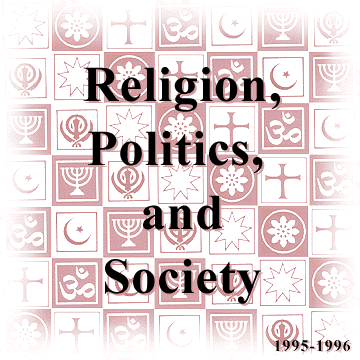- About this Program
- 2012 Conflict in the 21st Century
- 2011 Our Nuclear Age: Peril and Promise
- 2010 South Asia: Conflict, Culture Complexity, and Change
- 2009 Cities: Forging an Urban Future
- 2008 Global Poverty and Inequality
- 2007 Global Crises: Governance and Intervention
- 2006 The Politics of Fear
- 2005 Oil and Water
- 2004 Dilemmas of Empire and Nation Building
- 2003 Sovereignty and Intervention
- 2002 Global Inequities
- 2001 Race and Ethniciity: A Global Inquiry
- 2000 Global Games: Sports, Politics, and Society
- Symposium
- 1999 Global Crime, Corruption, and Accountability
- 1998 Exodus and Exile: Refugees, Migration, and Global Security
- 1997 The Future of Democracy
- 1996 Religion, Politics, and Society
- International Symposium
- Workshops
- Class
- 1995 20/20 Visions of the Future
- 1994 Ethnicity, Religion and Nationalism
- 1993 Transformations in the Global Economy
- 1992 - International Security: The Environmental Dimension
- 1991 Confronting Political and Social Evil
- 1990 The Militarization of the Third World
- 1989 Drugs, International Security and U.S. Public Policy
- 1988 Foreign Policy Imperatives for the Next Presidency
- 1988 Covert Action and Democracy
- 1987 The West Bank and Gaza Strip
- 1986 International Terrorism
- News
- Press Clips
- Calendar
- Resources
EPIIC Archives
1996 Religion, Politics, and Society

|
|
This year's class will exlore the role of religion in today's world. Yitzhak Rabin's assassination, liberation theology in Chiapas, the involvement of the church in overthrowing Communism in Eastern Europe, China's challenge to the Dalai Lama's successor, the Waco siege, the suppression of the Islamic Salvation Front in Algeria, the threats against author Salman Rushdie -- all dramatically challenge prior assumptions about the diminishing influence of religion. What is the relationship between civil society and religion? Is modernization -- defined in terms of secularism and scientism -- incompatible with either tradition or religion?
As a class we will examinine the resurgent status of religion on global and domestic politics.
We will consider the geopolitics and the geoculture of the alleged "clash of civilizations" and explore the role of religion in conflict and peacemaking from Ireland to Guatemala, from Bosnia to South Africa. Studying the encounters between religious nationalisms and secular states, we will look at the destruction and plans for reconstruction of multiethnic, multireligious societies; at the religious roots of violence and pacifism; and at the selective interpretation of tradition and memory in confrontations from India's Ayodhya mosque to Jerusalem's Temple Mount. Additionally, we will examine the debates surrounding the contentious terms of "fundamentalism" and "syncretism"; the role of religion and ritual as cultural resistance; comparative religious ethics and cross-cultural attitudes towards human rights and human values; women and religion; science, faith and the search for order; and the role of religion in American politics.

